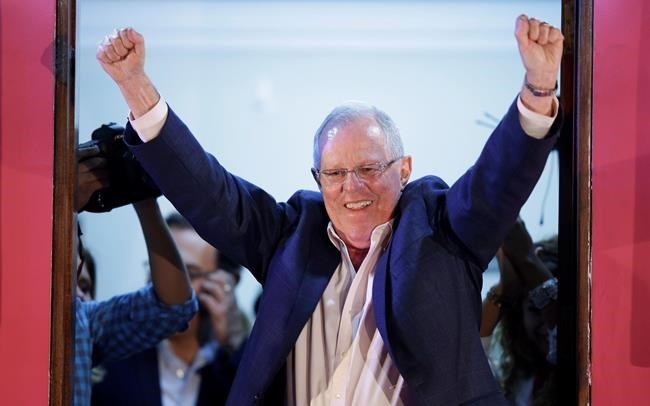
Presidential candidate Pedro Pablo Kuczynski celebrates from the balcony of his headquarter in Lima, Peru, Sunday, June 5, 2016. Early exit polls show presidential candidate Pedro Pablo Kuczynski with a slight lead over his rival Keiko Fujimori in Peru's runoff presidential election.(AP Photo/Martin Mejia)
Republished June 05, 2016 - 8:46 PM
Original Publication Date June 04, 2016 - 9:05 PM
LIMA, Peru - A former World Bank economist was edging out the daughter of imprisoned ex-President Alberto Fujimori in Peru's presidential election Sunday, according to early results from a vote widely seen as a referendum on the disgraced strongman's legacy.
With about half of polling stations counted, Pedro Pablo Kuczynski had 50.6 per cent of the votes compared with 49.4 per cent for his rival Keiko Fujimori, whose lead evaporated in the final weeks of campaigning.
While votes from Peru's hinterland, where support for Fujimori is strongest, will take days to come in, Kuczynski supporters were optimistic they'd prevail after two unofficial quick counts based on samplings of voting stations showed him winning by at least 1 percentage point. While that is within the statistical margin of error of the counts, the pollsters have a track record of accuracy.
Late Sunday night, Kuczynski addressed cheering supporters waving red-and-white Peruvian flags from the balcony of his campaign headquarters, urging them to be vigilant against fraud at the ballot box but otherwise sounding as if he had already been declared the winner.
"We're going to have a government built on consensus. No more low blows or fights," said the economist, who supported fellow conservative Fujimori in the 2011 runoff won by President Ollanta Humala.
But Fujimori showed no sign of conceding defeat.
"We're going to wait with prudence because all night votes will be coming in from the provinces, from abroad and from the rural voters of deep Peru," she said while dancing to her campaign theme song on a campaign truck parked outside the Lima hotel where she awaited results.
With 52 per cent of voting stations counted late Sunday night, Kuczynski had 4,724,897 votes compared to 4,613,861 for Fujimori.
A potential swing vote in a close race could be the 885,000 Peruvians eligible to vote abroad — about 3.8 per cent of the electorate. Many of those votes will take days to be tallied, according to Peru's electoral authority.
It would be a stunning turnaround for Kuczynski, who managed to narrow Fujimori's lead by abandoning his above-the-fray, grandfatherly appeal and attacking her as a risk to Peru's young democracy.
"Peru is on the threshold of becoming a narco-state," the 77-year-old candidate, who would be Peru's oldest president, told supporters at his closing campaign rally in Lima.
The reference wasn't just to Alberto Fujimori's well-known ties to corruption, organized crime and death squads, for which he's serving a 25-year jail sentence, but an attempt to draw attention to a string of scandals that have hobbled Fujimori in the final stretch. The most notable scandal was a report that one of her big fundraisers and the secretary general of her party was the target of a U.S. Drug Enforcement Administration investigation. Peru is the world's largest producer of cocaine.
Her running mate, Jose Chlimper, a Cabinet member at the end of Alberto Fujimori's government, also found himself in hot water for orchestrating the broadcast of a doctored audio tape in an attempt to clear the name of the party boss.
PPK, as Kuczynski is almost universally known in Peru, also benefited from a last-minute endorsement by the third-place finisher in the first round of voting, leftist congresswoman Veronika Mendoza, the protagonist of a massive anti-Fujimori demonstration this week the likes of which Peru hasn't seen since the turbulent end of Fujimori's rule 16 years ago.
Fujimori, who served as first lady in her father's administration after her parents' divorce, has tried to contain her rival's rise by taking distance from her father's crimes, even signing a pledge not to pardon him if elected. Kuczynski during the campaign said he'd consider allowing Fujimori finish his prison sentence at home.
At the same time, she's vowed to bring back the "iron hand" style of government for which many still revere the elder Fujimori, who is credited with taming Maoist Shining Path rebels as well as the country's hyperinflation. Instead of rebels, Keiko Fujimori promised to wield an iron fist against crime, a top voter concern. Among her proposals: build jails in high-altitude prisons in the Andes to punish and isolate dangerous criminals.
She also tried to cast her rival, the son of a Jewish-Polish immigrant who is married to an American and spent decades in business outside Peru, as part of the white elite establishment that has traditionally overlooked the needs of the poor.
Regardless of who wins, Keiko Fujimori has already reshaped Peru's political landscape.
In April, her Popular Force party won 73 of 130 seats in the unicameral congress, compared to just 18 for Kuczynski's movement.
___
Joshua Goodman is on Twitter: https://twitter.com/apjoshgoodman His work can be found at http://bigstory.ap.org/journalist/joshua-goodman
Franklin Briceno on Twitter at https://twitter.com/franklinbriceno His work can be found at: http://bigstory.ap.org/author/franklin-briceno
News from © The Associated Press, 2016